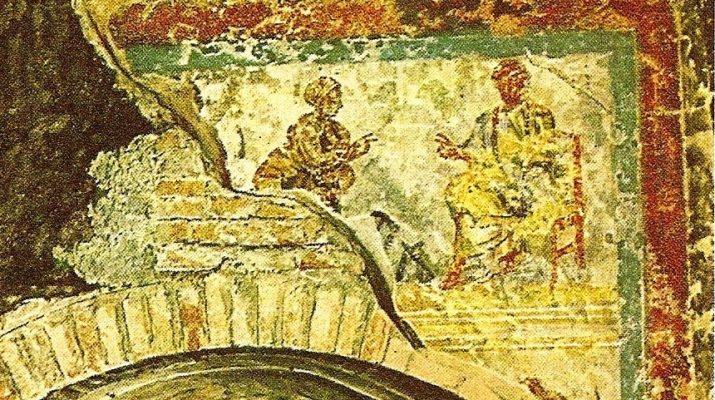Colossians 3:12-17
Christmastide C5
12 As God’sA chosen ones,B holyC and beloved,D
A “God’s” = Theos. From Proto-Indo-European origins, meaning do, put, place. This is God or a god in general.
B “chosen ones” = eklektos. From eklego (to choose, select, elect); {from ek (from, from out of) + lego (to speak, tell, mention)}. This is to select or choose. It is making a personal choice – a favorite.
C “holy” = hagios. From hagnos (holy, sacred, pure ethically, ritually, or ceremonially; prepared for worship, chaste, unadulterated, pure to the core; undefiled by sin; figurative for innocent, modest, perfect). God is totally different from humanity and thus set apart. That which is consecrated to worship God (elements of worship) or to serve God (as the saints) are holy because they are now set apart for God’s purposes. Holy because important to God. This is sacred physically, pure. It can be morally blameless or ceremonially consecrated.
D “beloved” = agapao. Perhaps from agan (much). This is love, longing for, taking pleasure in. It is divine love or human love that echoes divine love.
clotheE yourselvesF with compassion,G kindness,H
E “clothe” = enduo. From en (in, on, at, by, with, among) + duno (to sink into, set like the sun); {from duo (to go down, sink, or set)}. This is to put on as when one puts on clothes. It is the idea of sinking into one’s clothing.
F “yourselves” = splagchnon. 11x in NT. Perhaps from splen (spleen). This is inner organs, entrails, heart, liver. The guts were seen as the root of emotions. So, this could be visceral empathy or sympathy.
G “compassion” = oiktirmos. 5x in NT. From oiktiro (to have compassion, sympathy, or pity); from oiktos (pity). This is grace, mercy or compassion. It is feeling something sympathetic when someone else is having a hard time or difficulty. Used both of the mercies of God and have human compassion.
H “kindness” = chrestotes. 10x in NT. From chrestos (useful, good, well-fitted, benevolent, kind, gracious; also a name given to slaves in the ancient world); from chraomai (to use, make use of, give what is needed, act in a specific way, request). This is properly useable, good or ready for service – just what one needs to meet real needs. Figuratively, this speaks of moral excellence, strong character, uprightness, kindness, integrity.
humility,I meekness,J and patience.K
I “humility” = tapeinophrosune. 8x in NT. From tapeinos (low in position, depressed, low in circumstance; fig humiliated, low in spirit) + the base of phren (literally the diaphragm; used figuratively for heart, thought, or understanding; personal outlook we use to decide our actions, general outlook); {may be from phrao (to rein in, curb)}. This is humility, modesty. It is lowly or a humble mind.
J “meekness” = prautes. 12x in NT. From praus (gentle, meek, which implies humility); related to praios (meek, gentle, kind); related to praotes (mildness kindness, meekness; being temperate – gentle, but strong; implies humility). This is gentleness, mildness, meekness, or humility. It is strength mixed with gentleness.
K “patience” = makrothumia. 14x in NT. From makros (long, long lasting) {from mekos (length); probably related to megas (great or large)} + thumos (passion, wrath; actions emerging from passion or impulse) {from thuo (to rush along, breathe violently, offer sacrifice)}. Properly, this is long-passion or long-suffering – one who waits the needed amount of time before expressing anger. This is also patience, perseverance, and fortitude.
13 Bear withL one another and, if anyone hasM a complaintN against another, forgiveO each other; just as the LordP has forgiven you, so you also must forgive.
L “bear with” = anecho. 15x in NT. From ana (up, again, back, among, anew) + echo (to have, hold, possess). This is to endure, bear with, tolerate, persist, put up with.
M “has” = echo. Related to “bear with” in v13. See note L above.
N “complaint” = momphe. 1x in NT. From memphomai to blame, be disgraceful; be rejected due to doing bad things); from mempteos (rejected because one has been condemned). This is blame, a fault, or a quarrel.
O “forgive” = charizomai. From charis (grace, kindness, favor, gratitude, thanks; being inclined to or favorable towards – leaning towards someone to share some good or benefit; literal, figurative, or spiritual; grace as abstract concept, manner, or action); from chairo (to rejoice, be glad; used to say hello; properly, delighting in the grace of God or experiencing God’s favor); from char– (to extend favor, lean towards, be inclined to be favorable towards). This is to extend grace or favor, to grant forgiveness, to pardon or rescue.
P “Lord” = Kurios. From kuros (authority, supremacy). This is a respectful address meaning master or sir. It refers to one who has control or power greater than one’s own. So, it was also applied to God and Jesus as Master or Lord.
14 Above all,Q clothe yourselves with love,R which bindsS everything together in perfect harmony.T
Q “all” = pas. This is all or every.
R “love” = agape. Related to “beloved” in v12. From agapao (see note D above). This is love, goodwill, benevolence. It is God’s divine love or human love that mirrors God’s love.
S “binds” = eimi + sundesmos. Eimi is to be or exist. Sundesmos is 4x in NT. From sundeo (to bind together; it can be use of one who is imprisoned – a person that one is imprisoned with); {from sun (with, together with) + deo (to tie, bind, fasten, impel, compel; to declare something against the law or prohibited)}. This is something that binds closely, a joint or ligament or chain. It can also be a binding principle that unites a concept.
T “perfect harmony” = teleiotes. 2x in NT. From teleios (going through the steps to complete a stage or phase and then moving on to the next one; reaching an end and so being complete or “perfect”; also full grown or mature); from telos (an end, aim, purpose, completion, end goal, consummation, tax). This is perfection or unity. It is built upon a previous stage as a consummation of that time and beginning another one. It can evoke truth or spiritual growth. It can be understood in a mental or ethical sense, too.
15 And let the peaceU of ChristV ruleW in your hearts,X
U “peace” = eirene. Perhaps from eiro (to join, tie together to form a whole). This is one, peace, quietness, rest, peace of mind, harmony. Peace was a common farewell among Jews (i.e. shalom) and this well-wishing included a blessing of health and wholeness for the individual. This word also indicates wholeness and well-being – when everything that is essential is joined together properly. This is peace literally or figuratively. By implication, it is prosperity (but not in the sense of excessive wealth. Prosperity would have meant having enough from day to day.)
V “Christ” = Christos. From chrio (consecrate by anointing with oil; often done for prophets, priests, or kings). Literally, the anointed one, Christ. The Greek word for Messiah.
W “let…rule” = brabeuo. 1x in NT. From the same as brabeion (a prize; it is a reward following a success or victory in public games); from brabeus (an umpire). This is to rule or prevail. It can also be one who is acting as an umpire or arbitrator in conflict.
X “hearts” = kardia. Literally the heart, but figuratively mind, character, inner self, will, intention, thoughts, feelings. Also, the center of something. The word heart is only used figuratively in the Old and New Testaments. This is where “cardiac” comes from.
to which indeed you were calledY in the oneZ body.AA And beBB thankful.CC
Y “called” = kaleo. Related to keleuo (to command, order, direct); from kelomai (to urge on). This is to call by name, invite, to name, bid, summon, call aloud.
Z “one” = heis. This is one, a person, only, some.
AA “body” = soma. Perhaps from sozo (to save, heal, rescue); from sos (safe, well, rescued). This is body or flesh. It can be body in a literal or figurative sense (as the body of Christ). This is where the word “somatic” comes from.
BB “be” = ginomai. This is to come into being, to happen, become, be born. It can be to emerge from one state or condition to another or is coming into being with the sense of movement or growth.
CC “thankful” = eucharistos. 1x in NT. Related to “forgive” in v13. From eu (good, well done) + charizomai (see note O above). This is thankful or grateful. It can also literally mean being in good favor.
16 Let the wordDD of Christ dwellEE in you richly;FF
DD “word” = logos. Related to “chosen ones” in v12. From lego (see note B above).
EE “let…dwell” = enoikeo. 5x in NT. From en (in, on, at, by, with) + oikeo (to settle or be established somewhere in a permanent way, to make a home or live at home); {from oikos (house – the building, the household, the family, descendants; the temple)}. This is to dwell in, whether remaining in a specific status or condition. It can also mean at home.
FF “richly” = plousios. 4x in NT. From plousios (wealthy, having full resources; a rich person or God’s abundance); {from ploutos (abundance, wealth, or riches; money, possessions, spiritual abundance, or a valuable bestowment); from polus (much, many, abundant) OR pleo (to sail, voyage); {probably from pluno (to plunge – so to wash); from pluo (to flow)} OR pletho (to fill, accomplish, supply; to fill to maximum capacity)}. This is richly or abundantly.
teachGG and admonishHH one another in all wisdom;II
GG “teach” = didasko. From dao (learn). This is to teach, direct, instruct, or impart knowledge. In the New Testament, this is almost always used for teaching scripture.
HH “admonish” = noutheteo. 8x in NT. From nouthesia (admonition, teaching, warning; focusing one’s mind by using reasoning to reprove or warn someone); {from nous (mind, understanding, reasoning faculty, intellect, capacity to reflect); {from noos (mind) or from ginosko (to know, recognize, realize, perceive, learn; gaining knowledge through personal experience)} + tithemi (to put, place, set, fix, establish in a literal or figurative sense; properly, this is placing something in a passive or horizontal position)}. This is to warn, admonish, teach. Literally, it is to set one’s mind on something – specifically in giving someone a warning using logic. It can also be a gentle reproof.
II “wisdom” = sophia. From sophos (wise, clever, skilled, learned, cultivated); related to saphes (clear). This is skill, wisdom, insight, intelligence, clarity. It is wisdom as applied through a practical skill or shrewdness. It is not thoughtfulness or the mere gaining of intelligence for its own sake. Sophia is wisdom in action for everyday living.
and with gratitudeJJ in your hearts singKK psalms,LL hymns,MM and spiritualNN songsOO to God.
JJ “gratitude” = charis. Related to “forgive” in v13 & “thankful” in v15. See note O above.
KK “sing” = ado. Perhaps related to “hymns” and “songs” in v16. 5x in NT. See note OO below.
LL “psalms” = psalmos. 7x in NT. From psallo (to twang, play, sing psalms, pluck a stringed instrument such as a harp); {from psao (to rub)}. This is a psalm, a song sung of praise – generally accompanied by a harp or other stringed instrument. It can also refer to the book of Psalms.
MM “hymns” = humnos. 2x in NT. Perhaps from hudeo (to celebrate); probably akin to aido (to sing); from aeido (to sing). This is a hymn – a song to worship God, a psalm. It can be for praise or gratitude. The same word was used to worship gods and goddesses in Roman religion as well as songs in honor or heroes. It is where “hymn” comes from.
NN “spiritual” = pneumatikos. From pneuma (wind, breath, or ghost; a breeze or blast of air, a breath; figuratively, a spirit, the human soul or the part of us that is rational; also angels, demons, God, and the Holy Spirit); from pneo (to blow, breath, breathe hard). This is spiritual, spiritual people, or spiritual things – that which is ethereal or divine or religious.
OO “songs” = ode. Perhaps related to “hymns” in v16. 7x in NT. From aoide (a song); from the same as ado (to sing); from aeido (see note KK above). This is a song or hymn. It is a song that wasn’t written or rehearsed previously. It is a spontaneous expression of praise to God or an exhortation to people.
17 And whatever you do,PP in word or deed,QQ do everythingRR in the nameSS of the Lord Jesus,TT giving thanksUU to God the FatherVV through him.
PP “do” = poieo. This is to make, do, act, construct, abide, or cause.
QQ “deed” = ergon. From ergo (to work, accomplish, do). This is work, task, deed, labor, effort.
RR “everything” = pas. Same as “all” in v14. See note Q above.
SS “name” = onoma. Related to “admonish” in v16. May be from ginosko (see note HH above). This is a name, authority, cause, character, fame, reputation. The name was thought to include something of the essence of the person so it was not thought to be separate from the person.
TT “Jesus” = Iesous. From Hebrew Yehoshua (Joshua, the Lord is salvation); {from YHVH (proper name of the God of Israel; the self-existent and eternal one); {from havah (to become) or from hayah (to come to pass, become, be)} + yasha (to deliver, defend, help, preserve, rescue; properly, to be open, wide or free, which implies being safe. So, in a causative sense, this is to free someone)}. This is Jesus or Joshua in Greek – the Lord saves or the Lord is salvation.
UU “giving thanks” = eucharisteo. Related to “forgive” in v13 & “thankful” in v15 & “gratitude” in v16. From eu (see note CC above) + charis (see note O above). This is giving thanks, being thankful. It is a recognition that God’s grace is good and actively showing gratitude. It can also be used for saying grace before eating. This is where “eucharist” comes from.
VV “Father” = Pater. This is father in a literal or figurative sense. Could be elder, senior, ancestor, originator, or patriarch.
Image credit: “The Arrival of the Deceased before Christ” from the Domitilla Catacomb in Rome, early 5th century. Photo credit by Emmelinebq.




